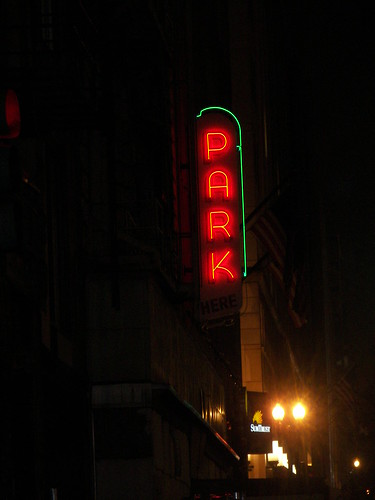Taxing free parking

1. The New York Sun has a blog called Culture of Congestion.
2. He mentioned USC professor Peter Gordon's blog, which looks at economics and urban planning. One of his recent entries is on the politics of congestion pricing, "Pricing and politics," and links to a journal article, co-authored by Donald Shoup, "The political calculus of congestion pricing."
I think this is relevant to the new proposal in City Council to tax "free parking" for office buildings.
I have a couple criticisms of the proposal. First, you have to balance the desire to discourage parking, with the desire to encourage organizations to continue to locate in the city. Because the height restriction limits the size of buildings, this induces higher rents. Only the businesses that get the most benefit from being close to the action will stay. Others that don't need that regular access displace to Arlington County, Alexandria (home of many many trade associations), Bethesda, and Silver Spring (remember the American Nurses Association being right on top of the Maryland Ave. exit of the L'Enfant Metro--well, they decided they didn't need to be that close to the Capitol and pay the higher rents).
Now you could argue so what about that, because so many of the people who work in the city, especially holding the high paying jobs, don't live in the City.
On the other hand, having a viable central business district and other regionally attractive and local commercial districts, and attractive housing stock, not to mention functioning municipal services and a relatively safe environment is also necessary.
One of the problems with our natural parochialsim and focus on problems is that if you were to talk to an average DC resident, many would complain about crime, even though for the most part (except in neighborhoods with a higher population of people in persistent poverty, like in Frozen Tropics' Trinidad neighborhood, see "All Hell Has Apparently Broken Loose") it's less of a problem. Crime is the big topic on neighborhood listservs and blogs and if that's all an outsider read, they'd get a skewed view of the city.
At least compared to the late 1980s and early 1990s when 30 people were killed a few blocks from my house over an 18 month period--the same area that is now 4 blocks from the New York Avenue Metro, and increasing home to families pushing baby carriages.
Still, you have to maintain a very delicate balance between attracting business, taxing business, and maintaining and improving city services.
2. Without stating from the get-go what the tax money is to be used for, I am almost immediately against the proposal. DC Government has a history of spending lots of money on projects that are difficult to measure adequate ROI (return on investment). If you want to tax free parking, then all the money should go into transportation infrastructure and service improvements and expansion. Tell us that now. Don't make this a city vs. suburbs argument from the start.
It's getting harder to encourage people to stop driving to the city and take the subway, when the subway breaks down, or when the cars are very full. A new subway car costs $4 million, and many are required to be able to run all trains with 8 cars.
3. In my Transportation Wish list, although I list addressing the free parking question (although my concern is more about induced driving), the very first item listed was instituting a transit "withholding" tax on people who work in the city.
Creation of a transit withholding tax assessed on DC workers (70% of DC based workers do not live in the city). Depending on the rate, this could generate up to $250 million annually. Such a tax is assessed in certain counties in Oregon to support transit there. It would have to be used solely for transportation system improvements, and yes, that includes roads, but in the interim would likely be focused on transit improvements.
Granted this would be a lot more controversial and even harder to get passed, but it would be fair, and frankly, it would tax everyone working in the District, not just drivers.
4. I wish that City Council and the District Government would start with a comprehensive plan first, and then legislate...
Labels: parking, progressive urban political agenda, sustainable land use and resource planning, transportation demand management



0 Comments:
Post a Comment
<< Home